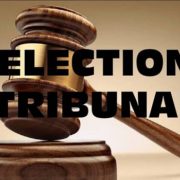Supreme Court Strikes Out Buhari’s Suit to void Section 84(12) of the Electoral Act

Lawyard is a legal media and services platform that provides…
The Supreme Court in Abuja has struck out a suit filed by President Muhammadu Buhari and the Attorney-General of the Federation, Abubakar Malami, seeking to void the provision of section 84(12) of the Electoral Act, 2022.
A seven-man panel of the Justices led by Justice Muhammad Dattijo on Friday held that the suit constituted an abuse of judicial process.
The apex court held that it lacked the jurisdiction to entertain the suit and that the president was not the rightful person to have brought the suit before it.
President Buhari and Malami had dragged the National Assembly to the Supreme Court over Section 84(12) of the Electoral Act.
They instituted the suit on April 29 seeking to void the provision of Section 84(12) of the electoral act 2022. The president and AGF are contending that Section 84(12) of the Electoral Act 2022 is in conflict with provisions of the constitution.
They contended that Section 84(12) of the Electoral (Amendment) Act, 2022 is inconsistent with the provisions of sections 42, 65, 66, 106, 107, 131, 137, 147, 151, 177, 182, 192 and 196 of the constitution as well Article 2 of the African Charter on Human and Peoples Rights.
In a counter-affidavit filed by NASS, it argued that laws made by lawmakers while exercising their legislative powers cannot be amended by invoking the Supreme Court as the constitution empowers NASS to make laws in Nigeria.
They, therefore, urged the apex court to strike out the suit instituted by President Buhari and AGF.
The President and AGF sought among other reliefs, “A declaration that the joint and combined reading of Sections 65, 66, 106, 107, 131, 137, 147, 151, 177, 182, 192 and 196 of the Constitution of the Federal Republic of Nigeria, 1999, (as amended); the provision of Section 84 (12) of the Electoral Act, 2022, which also ignores Section 84(3) of the same Act, is an additional qualifying and/or disqualifying factors for the National Assembly, House of Assembly, Gubernatorial and Presidential elections as enshrined in the said constitution, hence unconstitutional, unlawful, null and void.”
They argued that the 1999 constitution has provisions for qualification and disqualification for political offices.
They also sought “A declaration that having regard to the clear provision of section 1(3) of the Constitution read together with section 4 of the same Constitution, the legislative powers vested in the defendant do not permit or empower it to make any other law prescribing additional qualifying/disqualifying grounds for election to the national assembly, house of assembly, gubernatorial and presidential election outside the express constitutional qualification and disqualification provisions as already provided in each or all of sections 65, 66, 106, 107, 131, 137, 147, 151, 177, 182, 192 and 196 of the 1999 constitution of the Federal Republic of Nigeria (as amended), and without amendment to any of those sections is for the reason of inconsistency, unconstitutional and therefore null and void”
Delivering the judgment, Justice Aokmaye Agim said Buhari’s request to the National Assembly to delete the provision amounted to a constitutional violation.
He said “There is no provision in the constitution that vests the president the power to challenge the constitutionality or desirability of a legislation after he has assented or denied his assent. In this case, the president gave his assent.
“The president has no power to request or compel the national assembly to amend any part of the Act of the National Assembly in which he has participated in its making,“
“This suit cannot be entertained by this court under section 1(1) (a) of the Additional Jurisdiction of the Supreme Court Act. “
Consequently, the seven-man panel unanimously struck out the suit saying it was an abuse of court process.
Lawyard is a legal media and services platform that provides enlightenment and access to legal services to members of the public (individuals and businesses) while also availing lawyers of needed information on new trends and resources in various areas of practice.













